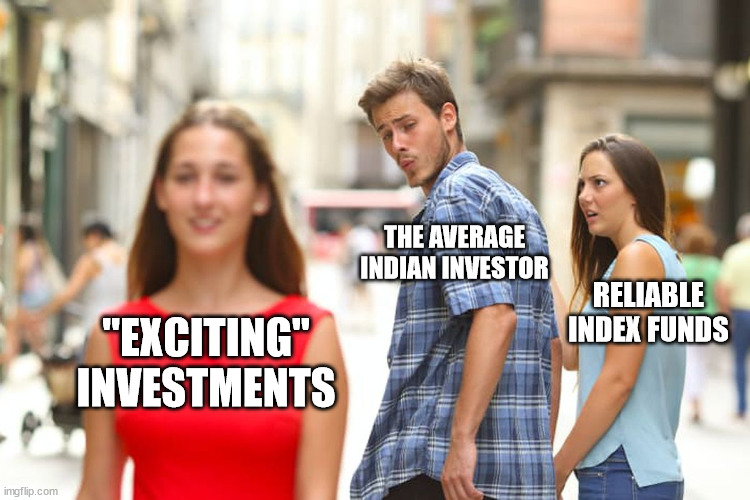Index Funds. A good fit for you?
It goes without saying that financial markets are complicated beasts. In addition to equities, there is a bewildering array of securities such as futures, options, and many different kinds of ‘funds’ (i.e. baskets of securities typically consisting of stocks).
Index funds are a class of funds that are well-suited for investors looking to grow along with the market- in line with the underlying index. They help earn decent returns from the markets without drowning in complexity. Yes, it is easy to overlook them due to their simplicity and seemingly modest promises, but they undoubtedly belong in the arsenal of every serious investor.

Let’s shine a spotlight on index funds and thoroughly examine them to understand why you should seriously consider investing in them.
What are index funds, how do they work?
Simply put, an index fund is a fund that aims to mimic an underlying index exactly. For example, if Rs. 1 lakh is invested in a Nifty 50 Index Fund, it represents investments in all the 50 stocks of Nifty 50 in a proportion represented by each stock’s weightage. The aim of an index fund is to generate returns similar to its benchmark index.
Experts and wildly successful investors on index funds
Is it really worth your while learning about index funds now, if you’ve done just fine with all your other investments so far? Yes, absolutely. Many retail investors often ignore or underestimate index funds due to their seemingly unglamorous nature, but they do so at their own peril.
Not convinced? Here’s what a few ace investors and financial authors have to say about index funds:
“By periodically investing in an index fund, for example, the know-nothing investor can actually outperform most investment professionals. Paradoxically, when ‘dumb’ money acknowledges its limitations, it ceases to be dumb.” ― Warren Buffet
“If you are incredibly talented and extremely lucky, you will beat the market most of the time. Everybody else will be better off investing in low-cost broad-market index funds.” ― Naved Abdali (Author of ‘Investing ― Hopes, Hypes, & Heartbreaks’)
“Most of the mutual fund investments I have are index funds, approximately 75%.” ― Charles Schwab (Founder of the financial services company ‘Charles Schwab Corporation’)
“Investing is a funny business. It's really easy to be average. Just buy an index fund. It's really hard to be above average.” ― Howard Marks (Co-founder, Oaktree Capital Management)


Hopefully, you’re now intrigued enough to want to learn more about why index funds come so highly recommended. So let’s dive in deeper.
How are index funds different?
There are other types of funds that retail investors can invest in; apart from ‘index funds’, two common kinds of funds you might have heard about are ‘actively-managed funds’ (or just ‘active funds’) and ‘exchange-traded funds’ (or ‘ETFs’). Let’s understand how index funds differ (or don’t!) from these other types of funds.
1. Active Funds
An active fund aims to produce returns that beat the relevant market (as represented by the corresponding market index). The managers of such funds use a wide variety of techniques, analysis and technologies to determine which securities to buy and sell at any given point, how much to hold of each of them and how much cash to maintain.
Contrary to such funds, index funds are ‘passive funds’; in other words, they do not involve any active interventions by fund managers, and their composition only changes when that of the underlying index changes, which typically happens infrequently.
2. ETFs
ETFs are like index funds, the only difference is that ETFs are listed on exchanges, where they get traded like any other equity shares, whereas index funds or other mutual fund units are not. Typically, ETFs will track a particular index, a sector, any commodity, or other assets just like an index fund. However, you do need a demat account for ETFs.
To conclude this post, I’d like to share a recent tweet from Nithin Kamath, who is the Founder & CEO of Zerodha - on why index funds (or for that matter ETFs) can help a large number of investors.
I'm surprised that, so many are surprised that just 1% of active traders make more than bank fixed deposits over 3 years timeframe. Active trading is like running a business, only a small % succeed. The only easy bit about trading is starting trading. 1/3https://t.co/dz4LGrTLRo
— Nithin Kamath (@Nithin0dha) January 4, 2022
Interested in considering index funds for your own portfolio? Look at some of our offerings by clicking below.
Stay posted for Part 2, where we delve into the various kinds of index funds available to Indian investors, and explore their benefits and drawbacks!
Disclaimer
This note is for information purposes only. In this material DSP Asset Managers Pvt Ltd (the AMC) has used information that is publicly available and is believed to be from reliable sources. While utmost care has been exercised, the author or the AMC does not warrant the completeness or accuracy of the information and disclaims all liabilities, losses and damages arising out of the use of this information. Readers, before acting on any information herein should make their own investigation & seek appropriate professional advice. Any sector(s)/ stock(s)/ issuer(s) mentioned do not constitute any recommendation and the AMC may or may not have any future position in these. All opinions/ figures/ charts/ graphs are as on date of publishing (or as at mentioned date) and are subject to change without notice. Any logos used may be trademarks™ or registered® trademarks of their respective holders, our usage does not imply any affiliation with or endorsement by them.
Past performance may or may not be sustained in the future and should not be used as a basis for comparison with other investments.
Mutual fund investments are subject to market risks, read all scheme related documents carefully.








Leave a comment